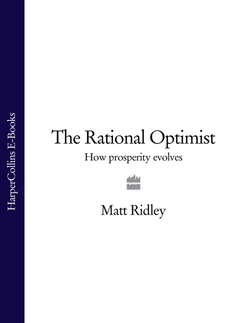Читать книгу The Rational Optimist: How Prosperity Evolves - Matt Ridley, Matt Ridley - Страница 15
The multiplication of labour
ОглавлениеYou are not just consuming the labour and resources of others. You are consuming others’ inventions, too. A thousand entrepreneurs and scientists devised the intricate dance of photons and electrons by which your television works. The cotton you wear was spun and woven by machines of a type whose original inventors are long-dead heroes of the industrial revolution. The bread you eat was first cross-bred by a Neolithic Mesopotamian and baked in a way that was first invented by a Mesolithic hunter-gatherer. Their knowledge is enduringly embodied in machines, recipes and programmes from which you benefit. Unlike Louis, you number among your servants John Logie Baird, Alexander Graham Bell, Sir Tim Berners-Lee, Thomas Crapper, Jonas Salk and myriad assorted other inventors. For you get the benefit of their labours, too, whether they are dead or alive.
The point of all this cooperation is to make (Adam Smith again) ‘a smaller quantity of labour produce a greater quantity of work’. It is a curious fact that in return for this cornucopia of service, you produce only one thing. That is to say, having consumed the labour and embodied discoveries of thousands of people, you then produce and sell whatever it is you do at work – haircuts, ball bearings, insurance advice, nursing, dog walking. But each of those thousands of people who work ‘for’ you is equally monotonously employed. Each produces one thing. That is what the word ‘job’ means: it refers to the simplified, singular production to which you devote your working hours. Even those who have several paying jobs – say, freelance short-story writer/neuroscientist, or computer executive/photographer – have only two or three different occupations at most. But they each consume hundreds, thousands, of things. This is the diagnostic feature of modern life, the very definition of a high standard of living: diverse consumption, simplified production. Make one thing, use lots. The self-sufficient gardener, or his self-sufficient peasant or hunter-gatherer predecessor (who is, I shall argue, partly a myth in any case), is in contrast defined by his multiple production and simple consumption. He makes not just one thing, but many – his food, his shelter, his clothing, his entertainment. Because he only consumes what he produces, he cannot consume very much. Not for him the avocado, Tarantino or Manolo Blahnik. He is his own brand.
In the year 2005, if you were the average consumer you would have spent your after-tax income in roughly the following way:
20 per cent on a roof over your head
18 per cent on cars, planes, fuel and all other forms of transport
16 per cent on household stuff: chairs, refrigerators, telephones, electricity, water
14 per cent on food, drink, restaurants etc
6 per cent on health care
5 per cent on movies, music and all entertainment
4 per cent on clothing of all kinds
2 per cent on education
1 per cent on soap, lipstick, haircuts, and such like
11 per cent on life insurance and pensions (i.e., saved to secure future spending)
and, alas from my point of view, only 0.3 per cent on reading
An English farm labourer in the 1790s spent his wages roughly as follows:
75 per cent on food
10 per cent on clothing and bedding
6 per cent on housing
5 per cent on heating
4 per cent on light and soap
A rural peasant woman in modern Malawi spends her time roughly as follows:
35 per cent farming food
33 per cent cooking, doing laundry and cleaning
17 per cent fetching water
5 per cent collecting firewood
9 per cent other kinds of work, including paid employment
Imagine next time you turn on the tap, what it must be like to walk a mile or more to the Shire River in Machinga province, hope you are not grabbed by a crocodile when filling your bucket (the UN estimates three crocodile deaths a month in the Machinga province, many of them of women fetching water), hope you have not picked up a cholera dose in your bucket, then walk back carrying the 20 litres that will have to last your family all day. I am not trying to make you feel guilty: I am trying to tease out what it is that makes you well off. It is having the hard work of living made easy by markets and machines and other people. There is probably nothing to stop you fetching free water from the nearest river in your home town, but you would rather pay something from your earnings to get it delivered clean and convenient from your tap.
So this is what poverty means. You are poor to the extent that you cannot afford to sell your time for sufficient price to buy the services you need, and rich to the extent that you can afford to buy not just the services you need but also those you crave. Prosperity, or growth, has been synonymous with moving from self-sufficiency to interdependence, transforming the family from a unit of laborious, slow and diverse production to a unit of easy, fast and diverse consumption paid for by a burst of specialised production.
